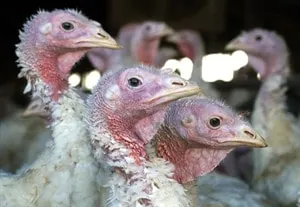
Urgent Call for Canada to Stockpile Avian Flu Vaccines: Time to Act Before It’s Too Late!
2025-01-03
Author: Michael
Introduction
In December, Canada faced its first human case of avian flu—an incident that shocked the nation when a teenager from Metro Vancouver spent nearly a month hospitalized, sparking serious concerns about the country's readiness for potential outbreaks.
Warnings from Experts
Sally Otto, a distinguished professor of zoology at the University of British Columbia, warns that while there’s currently no evidence of avian flu (H5N1) being transmitted through airborne particles, Canada must reinforce its defenses by stockpiling vaccines. With the virus making significant inroads among poultry and livestock, the risk of transmission to humans can’t be taken lightly.
Comparative Actions by the U.S.
Notably, the United States has proactively begun to stockpile avian flu vaccines in response to severe outbreaks in dairy cattle—a move that Canada has yet to adopt. Instead, Canadian health officials are contemplating a strategy to manufacture H5N1 vaccines on an as-needed basis. However, Otto cautions that this reactive approach poses a significant risk. “If we don’t have vaccines readily available and an outbreak spirals out of control, our response will be painfully slow,” she said.
Public Health Agency of Canada's Stance
The Public Health Agency of Canada (PHAC) acknowledges the urgency of enhancing preparedness against avian flu. They are currently evaluating vaccine options should the H5N1 strain escalate into a pandemic situation. “Our longstanding pandemic influenza preparedness strategy emphasizes the importance of having access to vaccines produced within the country,” PHAC stated. This strategy aims to mitigate risks stemming from potential vaccine embargoes and transportation issues, as seen during the COVID-19 pandemic.
Concerns over Vaccine Viability
Interestingly, Otto points out that health officials may have previously delayed stockpiling due to assumptions about the H5N1 vaccine’s shelf life, believing it would degrade too quickly to be considered viable. Recent research, however, indicates that the vaccine can remain effective for 10 to 20 years, prompting a reevaluation of its practical utility.
Virus Mutation Challenges
Additionally, health officials’ concerns over the swift mutations of the virus may be contributing to their hesitance. Yet, Otto emphasizes that even a partial protective strategy is better than none.
Collaborative Efforts
In response to the evolving crisis, PHAC is currently collaborating with both domestic and international vaccine manufacturers to ensure readiness in case an influenza pandemic arises. Furthermore, the agency is consulting with the National Advisory Committee on Immunization to assess risk factors, identify priority groups, and develop guidance on avian influenza preparedness.
International Collaboration
The international conversation is also underway, with PHAC engaging with counterparts in the U.S., the U.K., and European Union nations to strategize on securing H5N1 vaccines.
Conclusion
As we look ahead, the imperative for Canada to proactively stockpile these vital vaccines has never been clearer. Will our health officials step up to the challenge before it’s too late? Only time will tell!



 Brasil (PT)
Brasil (PT)
 Canada (EN)
Canada (EN)
 Chile (ES)
Chile (ES)
 Česko (CS)
Česko (CS)
 대한민국 (KO)
대한민국 (KO)
 España (ES)
España (ES)
 France (FR)
France (FR)
 Hong Kong (EN)
Hong Kong (EN)
 Italia (IT)
Italia (IT)
 日本 (JA)
日本 (JA)
 Magyarország (HU)
Magyarország (HU)
 Norge (NO)
Norge (NO)
 Polska (PL)
Polska (PL)
 Schweiz (DE)
Schweiz (DE)
 Singapore (EN)
Singapore (EN)
 Sverige (SV)
Sverige (SV)
 Suomi (FI)
Suomi (FI)
 Türkiye (TR)
Türkiye (TR)
 الإمارات العربية المتحدة (AR)
الإمارات العربية المتحدة (AR)